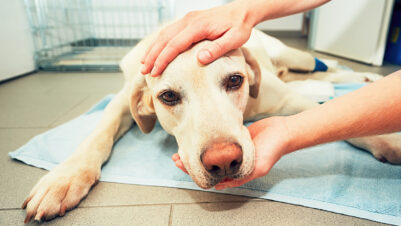MEMBERS OF THE BVA are being asked to help shape the UK profession’s response to the challenges it faces as a result of the vote to leave the European Union.
In an addition to the original programme, the BVA will be holding a “Breakfast on Brexit” debate at its annual congress during the London Vet Show (LVS) on 18th November.
The new BVA president, Gudrun Ravetz, told Veterinary Practice that the referendum result has huge implications for providers of veterinary services in areas such as manpower, surveillance and medicine regulation.
While both the BVA and the Royal College have set up working groups to prepare the UK veterinary profession’s position during negotiations on British withdrawal, it was vital to gather grass- roots opinion.
“We have had one council meeting since the June vote and have held meetings with the environment ministers for the four UK administrations. But this is the first major opportunity to talk to members and explain what we are doing. It is important that we give members the chance to tell us if they think there is anything we are missing,” she said.
Strands drawn together
Although this year’s LVS meeting is at a new venue, the ExCeL arena in East London, it will offer the usual wide- ranging programme of politics and CPD. But while the contentious issues sessions address some very different controversies, there are often key elements that draw the various strands together, she explains.
So the session on building greater resilience in vet students and young graduates has the same aim as one of the novel features of the programme this year, one-to-one sessions with staff of the insurance consultancy Lloyd & White. Both aim to ensure that more members are able to enjoy long and successful professional careers.
In the first, Kathryn Ecclestone of the University of Sheffield education department and Jenny Moffatt of the Skills Tree Ltd training consultancy will look at how different approaches to undergraduate education can help produce vets better equipped to cope with the pressures of the job.
The second, delivered as a new member services initiative, will offer expert advice on issues such as health and disability insurance. “I know when my year group graduated, that wasn’t something we were likely to think about. But this is a profession in which some people may sustain serious injuries, particularly those of us working in farm and equine practice.
So it is important that we are prepared to deal with any health issues,” the president said.
In another session, and one that Gudrun will be chairing, speakers will examine lessons to be learned from other professions in preventing human error. The system of checklists, used for several decades in the aviation industry, has now become commonplace in the National Health Service although the concept has yet to become widely adopted within the veterinary profession.
That should change, she suggests, as the reassurance offered by routine, systemic checks before and after surgery can build the confidence of inexperienced clinicians. It would also provide an effective safeguard against incidents that may have huge animal welfare implications, she points out.
This year’s showpiece Wooldridge memorial lecture is to be given by Professor Christine Nicol of the University of Bristol, a leading researcher into the welfare of poultry.
She will describe how science has helped to shed light on the factors affecting the welfare of all species.
When accepted into the veterinary profession, new graduates promise to put animal welfare at the top of their priority list. But how well do they achieve that goal?
In another session, Franck Meijboom, professor of ethics at the University of Utrecht in the Netherlands, will examine the professional and personal ethics of veterinary surgeons and will challenge his audience to look within themselves and assess whether they always practise what they preach.
Beyond the annual congress and throughout 2017, Gudrun knows that Brexit will be the political issue that dominates her presidential year. So she will get used to the idea of working under the gaze of her European colleagues as the BVA tries to represent the interests of its membership in a very different political landscape to that of the recent past.
But she is optimistic about the strength of the bonds between all members of the profession. “The theme I have chosen for the year is ‘the veterinary family’. We are a small profession, but we are a group of people with shared interests and a strong support network.
“Like any family we do sometimes fall out, but there is the trust and respect to bring us back together and to re-establish a position that is right for all of us.”








